By Ander Russell, Clean Water Program Manager
What are the key building blocks for sustainable agriculture in our region? This is a critical question our Clean Water team at RE Sources is answering as we move toward ramping up our advocacy, policy, monitoring, and educational work in the coming year. We believe advancing local, sustainable agriculture requires action on several fronts:
 Supporting a production-health-ecosystem balance
Supporting a production-health-ecosystem balance
For us, sustainable agriculture means that food production, human health, and ecosystem health are all in balance. We serve on the Whatcom Food Network Steering Committee to ensure protection of water and land for farming is part of a county-wide food system plan. We worked alongside the WFN to get policies in the Whatcom County Comprehensive Plan to create a food system plan for Whatcom County. Now the county is following through on those policies and setting up a Food System Advisory Committee, the purpose of which is, “to draft, implement, provide oversight for, and regularly update a county-wide food system plan to strengthen our local and regional food system.”
 Protecting farmland
Protecting farmland
Creating and protecting sustainable food production means making sure there is land available for farming well into the future. Along with advocating for policies that protect water, we work at the state and local level to prioritize land use decisions that preserve land for ag. RE Sources has long been a champion of local agriculture and family farms, advocating for stronger agricultural lands protection in the Whatcom County Comprehensive Plan. We push for preventing urban sprawl into ag zones and for locating rural development in ways that protect and enhance the amount of land available for farming.
 Supporting farmworker wellbeing
Supporting farmworker wellbeing
We believe that how we treat farmworkers in the food system has a direct connection with how we treat the land and water. We stand in solidarity with organizations like Community to Community and Familias Unidas in working towards a just and equitable food system. We will work in the coming year to build a strong intersectional approach to our clean water work that addresses poor working conditions for farmworkers, exacerbated by drought and pesticide exposure. The health of people most impacted by pollution and the health of our ecosystems cannot be separated.
 Ensuring adequate water supply
Ensuring adequate water supply
Sustainable food production also means making sure there is a long-term supply of water for farms — balanced with enough water for people, for salmon, and other fish and wildlife. At the WRIA 1 Planning Unit we are working along side of the ag community to address our county’s most pressing water supply challenges. A sustainable food system relies upon long-term certainty of access to water, so it is imperative that we ensure we are advocating for science-based solutions to our water supply challenges that take climate change impacts into account.
This year we had over 650 conversations about water supply with folks around the county. One of the outcomes of that work was a better understanding of the challenges with water and land access faced by smaller local farmers. These are the farms that produce our Community Supported Agriculture boxes, and that sell at local farmers markets and grocery stores, like the Bellingham Food Co-op. We are committed to listening more to these farmers as we move forward in advocating for solutions to water supply issues.
 Ensuring good water quality
Ensuring good water quality
Over a decade ago, we helped the launch the Tenmile Clean Water Project, a neighborhood group who adopted their watershed to improve water quality in rural Whatcom County. We continue to be a member of this community-led effort to involve rural property owners in taking action to protect and improve their watershed.
One key member of the Tenmile Clean Water Project is the Whatcom Conservation District. We support their work to address water quality impacts by farms of all sizes, including smaller hobby livestock farms. Monitoring water quality using sound, science-based methods is the best way to track the success of regulatory and voluntary efforts.
 Balancing agriculture with the needs of marine food systems
Balancing agriculture with the needs of marine food systems
Our work on a sustainable food system is also focused on ensuring thriving recreational, commercial and ceremonial shellfish harvesting. As a member of the Portage Bay Shellfish District Advisory Committee, we work alongside farmers, tribes and concerned residents to advise the County Council on actions and operations relating to the restoration of water quality in the Portage Bay watershed.
We can have clean and plentiful water, a strong local food system, a vibrant local economy, and preserve farmland. But it takes work to keep it that way. RE Sources is committed to holding respectful conversation, seeking collaborative solutions, and partnering with all stakeholders to find a common solution.

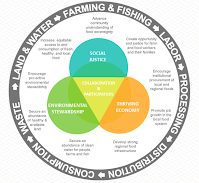 Supporting a production-health-ecosystem balance
Supporting a production-health-ecosystem balance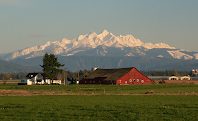 Protecting farmland
Protecting farmland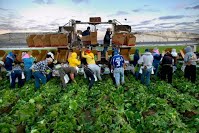 Supporting farmworker wellbeing
Supporting farmworker wellbeing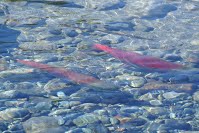 Ensuring adequate water supply
Ensuring adequate water supply Ensuring good water quality
Ensuring good water quality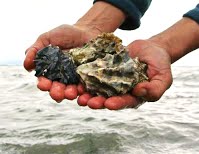 Balancing agriculture with the needs of marine food systems
Balancing agriculture with the needs of marine food systems